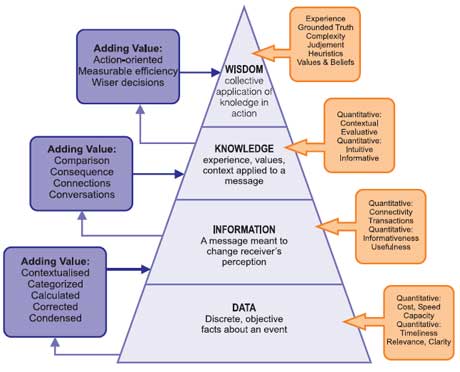Where is the wisdom we have lost in knowledge?
Where is the knowledge we have lost in information?
This wonderful quote from TS Eliot echoes the DIKW model of Data, Information, Knowledge and Wisdom.
An image speaks more than thousand words so here it is (thanks to Agile KM for sharing this) :

(pour les lecteurs français, je vous invite à lire l’éclairante description publiée dans la Master Thesis de Damien Boisbouvier, p.27 à 31).
Where does innovation stand you might ask. Peter Drucker answered this one :
“We know now that the source of wealth is something specifically human: knowledge. If we apply knowledge to tasks we already know how to do, we call it ‘productivity’. If we apply knowledge to tasks that are new and different we call it ‘innovation’.” Only knowledge allows us to achieve these two goals.”
So Innovation is the (upper) part of the Knowledge layer.
And where does Culture stand ? I’m currently reading Organizational Culture and Leadership by Edgar Schein, and I would tend to believe that culture is what turns organizational Knowledge into organizational Wisdom.
In any case, as we are overwhelmed with data and information, TS Eliot question remains as relevant as ever.
What do you think ?


There are no shortage of discussions to be found on the Data-Information-Knowledge-Wisdom hierarchy and precious little consensus.
One of the more lively recent exchanges can be found at the Harvard Business Review blog where David Wienberger managed, as he always does, to stir things up. See http://blogs.hbr.org/cs/2010/02/data_is_to_info_as_info_is_not.html
Into this above discussion I tossed one meditation which helps, I think, to ground the topic in some basic, and quite tangible, realities. See http://www.gollner.ca/2010/07/data-information-and-knowledge.html
Going further, I have conducted an even more exhaustive treatment of the topic in a post (and associated whitepaper) called “The Anatomy of Knowledge”. See http://www.gollner.ca/2010/10/the-anatomy-of-knowledge.html
In the latter, I offer up a variation on the DIKW pyramid and one of the most immediately notable things is that I lopped off Wisdom – declaring it to be a term that just doesn’t seem appropriate to use these days (regardless how many people seem to take solace in throwing it around and bathing in its warm glow).
As David so artfully addresses, there are some relatively well understood and well-trodden usages of the core concepts here but they are generally not very popular. That might be the most interesting part of the discussion.
Hi Joe, thank you very much for you insightful comment and all the references. I do admire David Weinberger, actually the former motto of this blog was “Hyperlinks subvert hierarchy” from David’s contribution to the Cluetrain Manifesto.
Actually I am kind of new to this thinking and the DIKW matched rather well the way I was trying to build internally this model. As I said somewhere else, all models are wrong, some are useful. I think this one is, as it is the foundation of some great discussions on the topic. The article I quote reminds that some wel respected figures such as Dave Snowden think it is just plain irrelevant.
Last but not least, I just loved the alignment betwen TS Eliot poetry and the DIKW model. I’m not so sure about wisdom being irrelevant in the organisation context. I’ve been studying Lean Management for the last year or so and I tend to believe that lean attempts to tend towards such thing as organisational knwoledge.
Thnaks again for the conversation and the links – I will check them out and let you know.
Bonjour Cecil
I remember posting my most recent article about the DIKW pyramid the day before meeting up with Dave Snowden for coffee (I had gotten to know him on a KM program at Royal Roads University) and he quickly pointed out that I had done that specifically to provoke him (:-] A spirited conversation followed. He thought that I had redeemed myself when I cast wisdom out of the discussion (:-]
And as for interesting connections to the DIKW pyramid, see also Frank Zappa…
Data is the raw material of information
Information is the rawmaterial of knowledge
But knowledge is NOT the raw material of wisdom
NIce move. Well it not necesarily is you’re right. However Wisdom comes from knowledge, be it implicit or explicit. In other word : not all knowledge contribute to wisdom. But all wisdom comes from knowledge.